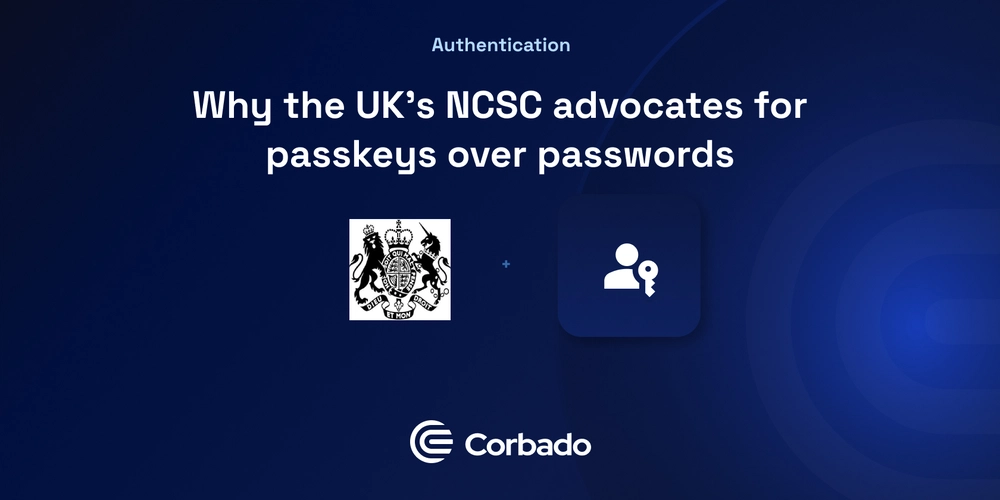Why the UK’s NCSC Advocates Passkeys Over Passwords for Better Cyber Security
Read the full article here. Passwords originated in the 1970s when the internet had a limited number of users. However, todray’s digital landscape requires dealing with billions of users, making traditional passwords obsolete. Cybercriminals easily exploit weak, reused passwords like “123456,” leading to significant security threats for businesses and individuals alike. Even Multi-Factor Authentication (MFA), implemented to bolster security, has vulnerabilities. For instance, SMS-based authentication is increasingly compromised due to SIM-swap attacks. What Are Passkeys and How Do They Improve Security? Passkeys present a secure alternative to passwords by using cryptographic technology to authenticate users. Each passkey is unique to a single website, effectively eliminating password reuse — a core cause of compromised credentials. Unlike traditional passwords, passkeys are virtually impossible to phish or steal, as they remain securely stored on users’ devices. This technology significantly reduces the risk of phishing attacks and provides a streamlined, user-friendly login experience. Passkeys cannot be forgotten or mistyped, removing the inconvenience and security risks associated with password resets. Barriers to Widespread Passkey Implementation Even with their clear benefits, passkey adoption faces challenges. First, migrating passkeys between different platforms is difficult, as a universal migration solution is currently lacking. Furthermore, robust account-recovery practices are crucial to prevent these processes from becoming targeted by cybercriminals themselves. User experience and awareness are also major hurdles. Many users still aren’t well-informed about passkeys or their advantages. Clear and comprehensive communication is essential to educate users and encourage widespread uptake. How the NCSC Is Promoting Passkey Adoption The UK’s National Cyber Security Centre (NCSC) actively promotes the adoption of passkeys by collaborating with industry leaders, advising businesses and exploring government integration in citizen-facing digital services. To boost general public awareness, the NCSC is utilizing influencer marketing campaigns on social media platforms, making secure authentication easy to understand and relatable. Through these combined efforts, the NCSC aims to shift authentication practices away from passwords, which are susceptible to compromise, towards passkeys — promising stronger, phishing-resistant security. Recommendations for Businesses and Individual Users Businesses adopting passkeys must first ensure strong backup and recovery mechanisms, guarding against inadvertent lockouts. Comprehensive planning is necessary when migrating existing users to passkeys. Individuals stand to benefit significantly from adopting passkeys. By eliminating the inherent weaknesses of passwords, such as reuse and phishing susceptibility, passkeys greatly enhance online security. Moreover, they streamline the login experience, making account access faster and more intuitive. Looking Ahead: Passkeys as the Future of Authentication As digital threats continue to evolve rapidly, authentication mechanisms must likewise improve. NCSC highlights passkeys as the definitive step towards achieving secure online authentication. Passwordless authentication will increasingly become the gold standard, driven by cross-industry cooperation, continuous technological innovations, and dedicated user education. The full-scale adoption of passkeys isn’t immediate, but the direction is clear: passkeys will inevitably replace traditional passwords, fostering a more secure and phishing-resistant online environment. To discover additional key insights about implementing passkeys and maximizing their adoption, read the full article here

Read the full article here.
Passwords originated in the 1970s when the internet had a limited number of users. However, todray’s digital landscape requires dealing with billions of users, making traditional passwords obsolete. Cybercriminals easily exploit weak, reused passwords like “123456,” leading to significant security threats for businesses and individuals alike. Even Multi-Factor Authentication (MFA), implemented to bolster security, has vulnerabilities. For instance, SMS-based authentication is increasingly compromised due to SIM-swap attacks.
What Are Passkeys and How Do They Improve Security?
Passkeys present a secure alternative to passwords by using cryptographic technology to authenticate users. Each passkey is unique to a single website, effectively eliminating password reuse — a core cause of compromised credentials. Unlike traditional passwords, passkeys are virtually impossible to phish or steal, as they remain securely stored on users’ devices. This technology significantly reduces the risk of phishing attacks and provides a streamlined, user-friendly login experience. Passkeys cannot be forgotten or mistyped, removing the inconvenience and security risks associated with password resets.
Barriers to Widespread Passkey Implementation
Even with their clear benefits, passkey adoption faces challenges. First, migrating passkeys between different platforms is difficult, as a universal migration solution is currently lacking. Furthermore, robust account-recovery practices are crucial to prevent these processes from becoming targeted by cybercriminals themselves.
User experience and awareness are also major hurdles. Many users still aren’t well-informed about passkeys or their advantages. Clear and comprehensive communication is essential to educate users and encourage widespread uptake.
How the NCSC Is Promoting Passkey Adoption
The UK’s National Cyber Security Centre (NCSC) actively promotes the adoption of passkeys by collaborating with industry leaders, advising businesses and exploring government integration in citizen-facing digital services. To boost general public awareness, the NCSC is utilizing influencer marketing campaigns on social media platforms, making secure authentication easy to understand and relatable.
Through these combined efforts, the NCSC aims to shift authentication practices away from passwords, which are susceptible to compromise, towards passkeys — promising stronger, phishing-resistant security.
Recommendations for Businesses and Individual Users
Businesses adopting passkeys must first ensure strong backup and recovery mechanisms, guarding against inadvertent lockouts. Comprehensive planning is necessary when migrating existing users to passkeys.
Individuals stand to benefit significantly from adopting passkeys. By eliminating the inherent weaknesses of passwords, such as reuse and phishing susceptibility, passkeys greatly enhance online security. Moreover, they streamline the login experience, making account access faster and more intuitive.
Looking Ahead: Passkeys as the Future of Authentication
As digital threats continue to evolve rapidly, authentication mechanisms must likewise improve. NCSC highlights passkeys as the definitive step towards achieving secure online authentication. Passwordless authentication will increasingly become the gold standard, driven by cross-industry cooperation, continuous technological innovations, and dedicated user education.
The full-scale adoption of passkeys isn’t immediate, but the direction is clear: passkeys will inevitably replace traditional passwords, fostering a more secure and phishing-resistant online environment.
To discover additional key insights about implementing passkeys and maximizing their adoption, read the full article here




























![[Webinar] AI Is Already Inside Your SaaS Stack — Learn How to Prevent the Next Silent Breach](https://blogger.googleusercontent.com/img/b/R29vZ2xl/AVvXsEiOWn65wd33dg2uO99NrtKbpYLfcepwOLidQDMls0HXKlA91k6HURluRA4WXgJRAZldEe1VReMQZyyYt1PgnoAn5JPpILsWlXIzmrBSs_TBoyPwO7hZrWouBg2-O3mdeoeSGY-l9_bsZB7vbpKjTSvG93zNytjxgTaMPqo9iq9Z5pGa05CJOs9uXpwHFT4/s1600/ai-cyber.jpg?#)














































































































































![[The AI Show Episode 144]: ChatGPT’s New Memory, Shopify CEO’s Leaked “AI First” Memo, Google Cloud Next Releases, o3 and o4-mini Coming Soon & Llama 4’s Rocky Launch](https://www.marketingaiinstitute.com/hubfs/ep%20144%20cover.png)





































































































































































































![Rogue Company Elite tier list of best characters [April 2025]](https://media.pocketgamer.com/artwork/na-33136-1657102075/rogue-company-ios-android-tier-cover.jpg?#)







































































_Andreas_Prott_Alamy.jpg?width=1280&auto=webp&quality=80&disable=upscale#)





































































































![Apple Watch Series 10 Back On Sale for $299! [Lowest Price Ever]](https://www.iclarified.com/images/news/96657/96657/96657-640.jpg)
![EU Postpones Apple App Store Fines Amid Tariff Negotiations [Report]](https://www.iclarified.com/images/news/97068/97068/97068-640.jpg)
![Apple Slips to Fifth in China's Smartphone Market with 9% Decline [Report]](https://www.iclarified.com/images/news/97065/97065/97065-640.jpg)



































































































































